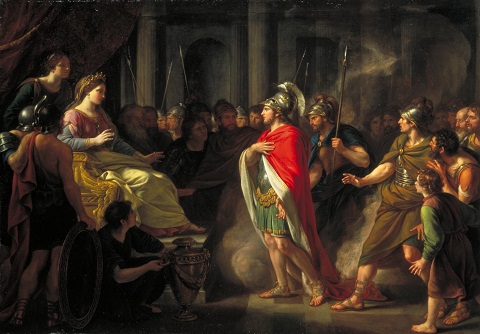In 2016 director Daisy Evans invited us to enter the creative processes
involved in staging and performing Henry Purcell’s
The Fairy Queen
- “we’re creating it as we go along” - presenting riotous rehearsals during
which luvvies, divas and techies roamed around a stage littered with
lights, ladders and electric leads. Musicians hunted for their seats,
soloists for their scripts, and the entire ensemble seemed in search of a
production. Last year, Evans offered a
‘King Arthur for the Brexit Age', re-ordering the score, discarding Dryden’s original text entirely and
replacing the poet’s allegorical obfuscations with what she described as “a
stage-invasion protest” in which opposing factions of Brexiteers and
Remainers offered “their perspective on the current stage and meaning of
British identity”. Brechtian flip-charts reminded us of the work’s
‘relevance’, the final poster bluntly stating, “The Barbican - Today”.
Nahum Tate’s libretto for Purcell’s three-act tragic opera, Dido and Aeneas, which was derived from the poet’s own play, Brutus of Alba or The Enchanted Lovers and various
translations of Book IV of Virgil’s Aeneid, might also seem to
offer scope for similar ‘modern, political intervention’. Certainly, there
has been much speculation about the opera’s engagement with the crises of
the final years of the Stuart monarchy. The Prologue, for which the music
is lost, might be thought to allude to the Glorious Revolution of 1688 with
Phoebus and Venus representing those embodiments of the new political
order, William and Mary. After all, in Act 1 the chorus celebrate: “When
monarchs unite, how happy their state,/They triumph at once o’er their foes
and their fate.” Then again, the opera’s tragic account of a Prince’s
desertion of a Queen would surely have made for a less comfortable court
entertainment. Moreover, in a poem written in 1686 Tate had alluded to
James II as Aeneas, intimating that his abandonment of Dido (a symbol of
the nation) was a result of his duping by the evil Sorceress and her
witches (signifying Roman Catholicism). Was Tate covertly warning William
III not to mistreat his English queen and nation?
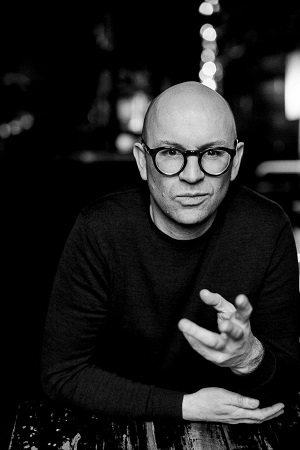 Thomas Guthrie. Photo credit: Theresa Pewal.
Thomas Guthrie. Photo credit: Theresa Pewal.
The scholarly debates have engaged with multifarious musical and
extra-musical factors - literary, historical, sociological, political. And,
when I ask director Thomas Guthrie about his plans for the performance of Dido and Aeneas that the
Academy of Ancient Music
will present in the Barbican Hall on 2nd October, he explains his
fascination with the history of the literary treatment of Dido -
particularly Ovid, Virgil and then, in the sixteenth century and beyond,
Marlowe and others - and how that’s been reflected in the way the story has
been used politically, especially in reference to Elizabeth I. “I find her
especially useful in fleshing out and understanding the character of Dido
in the opera - I think it will be a real key for us. I’ve found Deanne
Williams’ article ‘Dido, Queen of England’,
[1]
particularly helpful: “Elissa dies tonight, and Carthage flames tomorrow!”
The idea of celibacy being a necessity for her, despite huge political
pressure to marry in the state’s interests, precisely to defend her
‘marriage to the state’, possibly provides answers - or at least a context
- to the very real tragedy of Aeneas’ change of heart, the subsequent sense
of betrayal Dido feels, and her suicide. I think this is at the heart of
it.”
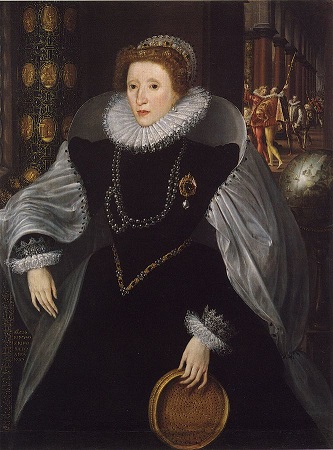 ’The Sieve Portrait’ by Quentin Metsys the Younger (c.1583; British Library Collection; Pinacoteca Nazionale, Siena, Italy/Bridgeman Images). This portrait of establishes a connection between Elizabeth I’s virginity and England’s military power. The sieve represents both the Queen’s chastity and her discerning moral judgement. The pillar to the right of Elizabeth depicts scenes from the Aeneid, including Dido’s first meeting with Aeneas and her suicide.
’The Sieve Portrait’ by Quentin Metsys the Younger (c.1583; British Library Collection; Pinacoteca Nazionale, Siena, Italy/Bridgeman Images). This portrait of establishes a connection between Elizabeth I’s virginity and England’s military power. The sieve represents both the Queen’s chastity and her discerning moral judgement. The pillar to the right of Elizabeth depicts scenes from the Aeneid, including Dido’s first meeting with Aeneas and her suicide.
Thomas also makes it clear that he inclines to a “less is more” approach
and that musical values will be paramount. His work always displays a
genuine commitment to new ideas and to challenging the audience but he
emphasises that while he aims to make a work feel “fresh and relevant” he
does “insist that the music and the storytelling are the most important
elements”: “I try to inspire the audience to engage in a critical way in
order to achieve good theatre. It’s not a matter of telling them what to
think or announcing ‘look how clever I am’; you have to invite them to
imagine for themselves. To encourage them to make their own pictures that
resonate with their own tastes, experiences and memories.”
Thomas points out that there are many questions unanswered, and often
unasked, about Purcell’s Dido and Aeneas. Indeed, the plot is
characterised by ambiguity and evasion. How does Dido die, for example?
Thomas comments that he does not think that the means of suicide is
particularly important: “A decision of course has to be made here - but it
is more a question of understanding why, and not settling for a
purely ‘heartbroken crossed lover’ assumption, which is common, and seems
too sentimental and shallow to me.”
I raise a further issue which has troubled commentators, whether Dido is
chaste - a question posed with surprising directness by Charles Perrault:
‘What had that Piety of Father Aeneas to do in the Cave with Dido Queen?’
[2]
Thomas replies: “Again, I think it’s clear from the classical sources and
then from Aeneas himself in Tate’s libretto (‘one night enjoyed’) that she
has not been chaste; and, the shame and betrayal to Carthage that she then
feels - after the sacrifices one presume she has made - are then more
understandable. To me one of the biggest unanswered questions centres
intriguingly around the Second Woman’s aria, ‘Oft she visits this lone
mountain’. Why has she sung this strikingly inappropriate song as an
entertainment at the grand state ‘betrothal picnic’? Or, who has put her up
to it, and why? Belinda is Dido’s closest ‘member of staff’; a
lady-in-waiting, a confidante, but also a go-between. One can only imagine
the pressure on her to snap the queen out of her apparent crisis/paralysis
when she sings her first, ‘Shake the cloud from off your brow!’ - in the
presence of the entire court. Matters of government must be pressing:
famine, threat of invasion. How long has it been since Dido has made a
public appearance? And, as a woman, she must want to be seen to be able to
keep any apparent overly emotional behaviour under control. Is Belinda
warning Dido by instructing the Second Woman to sing this particular song,
with its ominous, violent and well-known ending? Or, is she warning Aeneas,
and if so, why?”
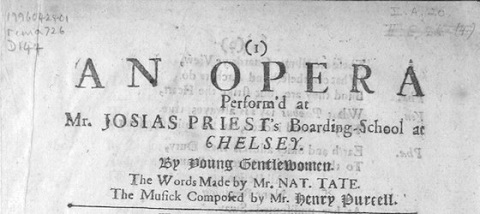 The first page of the libretto of Dido and Aeneas printed for the Chelsea school performance (detail). From the collection of the Royal College of Music.
The first page of the libretto of Dido and Aeneas printed for the Chelsea school performance (detail). From the collection of the Royal College of Music.
Then there is the problem of ‘the sources’. There is no autograph score,
and the so-called Tenbury College manuscript (now in the Bodleian Library),
which is generally considered to be the ‘best’ source available, was made
at least half a century after the first performance of the work and lacks
some music alluded to in the Chelsea libretto. The first known performance
of the tragic opera is that given at a girls’ boarding school in Chelsea
some time before December 1689 (when Thomas D’Urfey’s spoken epilogue was
published in his New Poems), and for a long time it was
assumed that Purcell had composed his opera for the young ladies of
dancer-choreographer Josias Priest’s educational establishment.
Subsequently this theory has been challenged: allusions in the Prologue and
Epilogue hint at a spring-time premiere, and some scholars have suggested
that, on stylistic grounds, the opera could have been composed by 1685, or
even earlier. Dido and Aeneas was certainly influenced - in its
broad structure, use of dance and dramatic choral roles, and
arioso-recitative idiom - by John Blow’s Venus and Adonis
(c.1683), which had been performed privately at the court of Charles II and
then adapted for Priest’s school in April 1684, and a similar performance
history would account for discrepancies between the extant libretto for the
Chelsea performance and the earliest surviving score which includes a
baritone Aeneas as well as countertenor, tenor and bass chorus parts.
Bryan White’s discovery of a copy of letter dated 15th February 1688/9
written by one Rowland Sherman, a merchant with the Levant Company in
Aleppo, to his friend and fellow merchant, James Piggott, in London, seemed
to resolve some of the controversies relating to the date and context of
the first performance and the original existence of instrumental music now
lost. Sherman asks for news of the London cultural scene, specifically: ‘If
Harry has sett to the Harpsechord the Symph[ony] of the mask he made for
Preists [sic] Ball, I should be very glad of a coppie of it. There's
another Symph[ony] in the same mask I think in Cb in the 2d p[ar]t is a
very neat point th[a]t moves all in quavers. if he's applyed th[a]t to the
harpsechord, ’twould be very acceptabl too.’
[3]
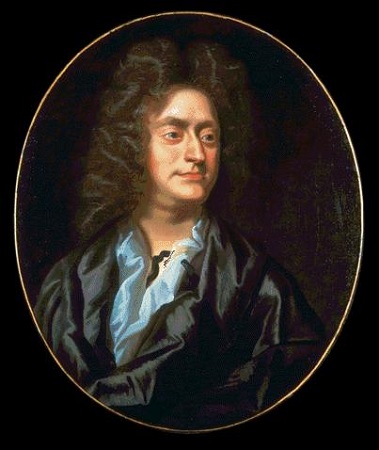 A portrait of Henry Purcell (c.1680).
A portrait of Henry Purcell (c.1680).
Yet, Dido and Aeneas is richly equivocal and is unlikely ever to
divulge all its secrets. Thomas Guthrie has frequently made use of puppets
and masks in his work, and I ask the director what led to his interest in
puppetry and whether he plans to make further use of them in his
exploration of Dido and Aeneas? Thomas explains that his interest
was initially sparked when he was working with I Fagiolini in a
2001 production of Purcell’s Indian Queen directed by Peter
Wilson. He remembers that bass-baritone Matthew Brook, “such a natural
actor”, sang in the production, and that it was Matthew’s particular use of
a puppet in ‘Ye twice ten hundred deities’ that inspired his own subsequent
staging of Winterreise with pianist Gary Cooper.
Thomas comments that the puppets must “work within and maintain the
integrity of the musical setting” and must not be “an interference”. His
staged Winterreise impressed the critics - in the words of one
reviewer, ‘puppet and singer-animator become one’ - and he explains that,
while he is not ever 100% convinced by or pleased with every aspect of his
work, “this production sought, by use of the puppet, to unlock the
storytelling and give opportunity for insight and freshness, but keep the
music-making integrated, which, despite its other faults, I think it did.”
“Puppets will only work if the audience are on board, if the puppets invite
the audience into the work. This can create a moment of magic, of wonderful
theatre.” Puppets are often symbolic - in Asia, rites of passage, birth,
marriage and death, are traditionally marked by puppet performances - and
Thomas stresses that it is important that the audience should be made to
believe in the purpose of the puppets within the theatrical context. He
modestly professes that, though he has studied and taught puppetry, he is
“not absolutely a 100% master of the art!” but adds that, “‘if you can hold
a teddy bear up to a child - and convince the child of its reality - then
you certainly have the basic skills to work a puppet. Not everyone has this
instinct, actually, but if you can do it, then good basic
puppetry, though a great and true craft, is at least within your grasp.”
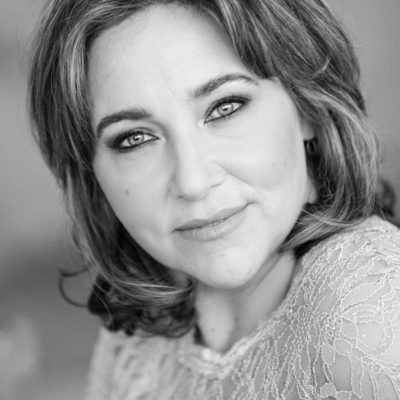 Christine Rice. Photo Credit: Patricia Taylor.
Christine Rice. Photo Credit: Patricia Taylor.
In 2016 Thomas produced a concert staging of Dido and Aeneas with
the young singers of the early music ensemble Sestina, musicians
from Original Instruments and dancer/choreographer Bridget Madden,
a production which travelled to three venues of differing size and
environment - the Ulster Hall in Belfast, Londonderry’s The Glassworks and
The Church of the Sacred Heart in Newry. At the Barbican Hall, the role of
the Carthaginian Queen will be taken by Christine Rice, with whom Thomas
was a fellow student, and the director explains that during the eleven-day
rehearsal process the need to tell a story through music will be uppermost;
ideas will be explored, shaped by Rice’s own interpretation, and that of
Rowan Pierce, who will sing the role of Dido’s companion Belinda, Neal
Davies who takes the part of the Sorceress, and Ashley Riches who will
perform Aeneas. Things that don’t ‘work’ will be discarded. “The singer
needs to be the person working the puppet, communicating the idea; it won’t
work if there is a puppeteer … I want to make the audience ‘shift’ in their
engagement with the opera, to feel guilt!”
One issue that Thomas notes must be addressed when planning any performance
of Dido and Aeneas is the question of which compositions to
programme alongside the opera. At the Barbican Hall, the first half of the
concert will present a ‘funeral for the late Queen of Carthage’,
accompanied by other works by Purcell. The opera will, then, essentially be
a flash-back, taking us ‘behind the scenes’: we will see the characters
behave in certain ways before the funeral, perhaps intimating answers to
some of the opera’s conundrums.
Thomas concludes, “Purcell may seem ‘simple’ but his compositions invite
interpretation: and, he always gives more than he needs - that is
the nature of his genius. And, it’s why we delight in his music so much: he
gives much more than is needed to be ‘great’. So, we must not distract from
this, but celebrate it.”
At the close of Purcell’s opera, Dido bids her unforgettably poignant
farewell, “Remember me, but ah! forget my fate.” In this tragic gesture,
Purcell poses one final question: just how should we remember
Dido, Queen of Carthage? What does she represent? Perhaps we will find some
answers at the Barbican Hall on 2nd October …
Dido and Aeneas
: A funeral for the Queen of Carthage, Academy of Ancient Music,
Barbican Hall, 2nd October 2018.
Claire Seymour
[1]
Deanne Williams, ‘Dido, Queen of England’, ELH 73.1 (2006): 31-59.
[2]
In Parallèle des anciens et des modernes, 4 vols. (Paris,
1688-97).
[3]
Bryan White, ‘Letter from Aleppo: Dating the Chelsea School
Performance of Dido and Aeneas’, Early Music,
37/3 (2009): 417-428.
